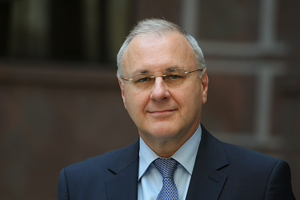Article contents
Interview with H.E. Ambassador Vladimir Tarabrin
Published online by Cambridge University Press: 17 December 2021
Abstract

Vladimir Tarabrin – Special Representative of the Minister of Foreign Affairs of the Russian Federation for international anti-terrorist cooperation, Director of the Department on the Issues of New Challenges and Threats of the Ministry of Foreign Affairs of the Russian Federation (MFA). He graduated from the USSR Ministry of Foreign Affairs' Moscow State Institute of International Relations. He has been working in the Ministry of Foreign Affairs of USSR/Russia (MFA) since 1979 and held various diplomatic posts in the central office of the MFA and abroad. 1995–1998 – Head of Division, Deputy Director of the Legal Department. 1998–2002 – Senior Counsellor and Legal Advisor of the Permanent Mission of the Russian Federation to the United Nations in New York / Alternate Representative of the Russian Federation to the United Nations Security Council. 2002–2008 – Deputy Director of the Legal Department. In 2008–2013 he served as the Ambassador Extraordinary and Plenipotentiary of the Russian Federation to the Gabonese Republic. In 2013–2017 he was Ambassador at large (international anti-corruption cooperation). In 2017–2019 – Director of the Department Crisis Situation Centre of the MFA. Has diplomatic rank of Ambassador Extraordinary and Plenipotentiary.
Keywords
Information
- Type
- Interview
- Information
- International Review of the Red Cross , Volume 103 , Issue 916-917: Counterterrorism, sanctions and war , April 2021 , pp. 97 - 107
- Copyright
- Copyright © The Author(s), 2021. Published by Cambridge University Press on behalf of the ICRC.
References
1 For instance, in paragraph 7 of the preambular part of United Nations Security Council Resolution 2178, the Council underscores that respect for human rights, fundamental freedoms and the rule of law are complementary and mutually reinforcing with effective counterterrorism measures, and are an essential part of a successful counterterrorism effort. Moreover, in the preambular paragraph 6 of United Nations Security Council Resolution 2395, the Council underscores that effective counterterrorism measures and respect for human rights, fundamental freedoms, and the rule of law are complementary and mutually reinforcing, and are an essential part of a successful counterterrorism effort.
2 According to Article 15 of the Criminal Code of the Russian Federation, grave crimes are intentional acts for the commission of which the maximum punishment stipulated by the Code exceeds five years’ deprivation of liberty, but does not exceed ten years’ deprivation of liberty, whereas particularly grave crimes are those punishable by deprivation of liberty for a term exceeding ten years or a more severe punishment.
3 A reference can be made to paragraphs 6, 9, 17, 24 and 31 of the preambular part of United Nations Security Council Resolution 2396 and to paragraphs 7 and 9 of the preambular part and paragraph 17 of the operative part of United Nations Security Council Resolution 2482.
4 See Articles 205, 205.1, 205.2 (paragraph 2), 205.3–205.5, 206, 208, 211 (paragraph 4), 281, 282.1–282.3 or 361 of the Criminal Code of the Russian Federation.
5 Article 2, paragraph 1, subparagraph 2, of the Yekaterinburg Convention.
6 Article 2, paragraph 1, subparagraph 3, of the Yekaterinburg Convention.
7 Article 5 of the the Yekaterinburg Convention.
8 Article 9, paragraph 1, subparagraph 4, of the Yekaterinburg Convention.
9 Article 9, paragraph 1, subparagraphs 5 and 6, of the Yekaterinburg Convention.
10 Article 10 of the Yekaterinburg Convention.
11 Article 11 of the Yekaterinburg Convention.
12 Article 12 of the Yekaterinburg Convention.
13 E.g. the 2008 Agreement on Cooperation amongst CIS Participating States for the Protection of Persons subject to Protective Measures, the 2012 Agreement on Cooperation in Training of Specialists in the field of the Prevention of Terrorism in Educational Institutions of CIS Participating States, and the 2012 Agreement on the Exchange of Information in CIS for the Prevention of Terrorism and Other Violent Forms of Extremism and Their Financing.
- 1
- Cited by

